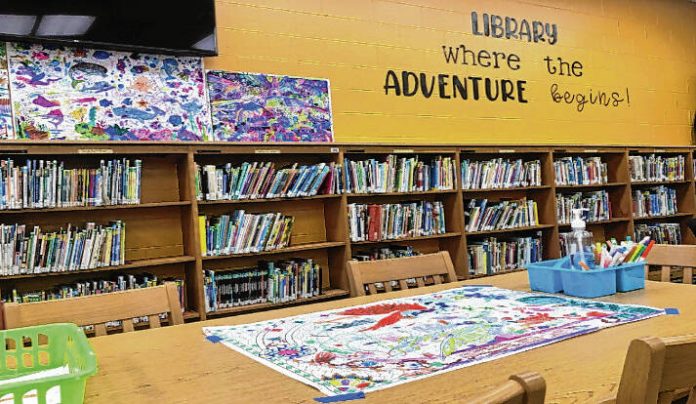Bartholomew Consolidated School Corp. board members have updated a policy for library book complaints, with the majority of school board members ultimately deciding to strike a provision that would have specifically allowed complaints for reasons other than obscenity and harm to minors.
The school board approved updates to two policies dealing with library materials on Monday, with the vote being split in both cases. An update to Policy 9130 – “Public Complaints and Concerns” was approved 4-3, with Jason Major, Logan Schulz and Dale Nowlin voting against the final version of the policy.
The board also voted 5-2 to approve updates to Policy 2520 – “Selection of Library Materials and Equipment,” with Major and Schulz voting in opposition.
“We’re not talking George Orwell’s ‘1984’ or ‘To Kill a Mockingbird,’” Schulz said, in discussing his views on the complaint process. “… I’ve never been part of an ideological argument on books. This has strictly been about how much adult content is too much.”
Both policies were updated due to a new law that requires school libraries to, among other things, establish a formal complaint process for parents, guardians and community members to submit requests to remove library materials that are obscene or harmful to minors.
Much of the local board’s discussion has centered on Policy 9130. Prior to the update, school officials had been using the existing policy’s section on instructional materials to address complaints regarding library books.
The updated policy creates a new section for school library materials. The section states that the parent or guardian of a student, or a community member residing within the corporation, can submit a request to remove material they believe to be obscene or harmful to minors, as defined by Indiana Code.
The request is initially submitted to the building principal, who will then inform the assistant superintendent of human resources. The assistant superintendent will, upon the superintendent’s approval, will appoint a review committee that may consist of one or more professional staff members and one or more laypersons knowledgeable in the area.
“Provided, at least one (1) member of the review committee shall be the parent of a student,” the policy states.
The superintendent will be a member of the committee as well, by nature of his office.
If the requester does not agree with the committee’s recommendation, they can appeal the matter to the school board through a written request to the superintendent.
The board will then review the request and decision at the next public meeting after an appeal is submitted, but it is not required to make its final decision at that meeting. The board will inform the complainant of its decision within 60 business days of the public meeting where the materials were first reviewed.
During a recent work session, some board members indicated they would be open to also allowing challenges based on all or some of the criteria for library material selection, though others were not sure.
Based on this feedback, BCSC attorney Michael McIver included a provision in the draft stating that parents and community members could go through the same review and appeal process for “material that they contend was inappropriately selected for a school library’s collection” given the guidelines in Policy 2520.
Per the updated Policy 2520, the superintendent will develop administrative guidelines for the selection and maintenance of library material and equipment, and the policy lists several criteria that should be considered. These are as follows:
- A resource’s support for the general educational goals and teaching strategies of the school corporation
- A resource’s relevance and lasting literary value
- The reputation and qualifications of the author, creator or publisher
- The value of the resource in relation to its cost
- The suitability of subject, content and style for the intended audience
- The needs of an individual school program based on requests from administrators and teachers
- The needs of individual students based on requests by teachers or students
- The representation of various viewpoints on controversial subjects with the goal of providing a balanced collection
- Maintaining the accessibility of the collection.
Board member Todd Grimes made a motion to approve 9130 without the provision for challenges based on selection criteria, and it passed 4-3.
Before voting, Nowlin noted that the existing policy did not limit complaints to just obscenity and harm to minors.
“I trust the system and the policy that we’ve been using,” he said. “And to me, this is as close to that as we can get with the new legislation. I hear a lot of talk about ‘Don’t go above what the state requires.’ I don’t know that it’s going above or going below, I think it’s just that we trust our parents and our community to bring legitimate concerns, and we trust the process we’ve been using to filter through those.”
In addition to describing the new process, the updated policy 9130 states that no challenged material may be removed solely because it presents ideas that may be “unpopular or offensive to some” without meeting the definitions of obscenity and harm to minors under Indiana Code. Furthermore, if the board decides to remove material, it will provide a statement with its reasons for doing so.
Additionally, the policy states that the board desires to resolve “misunderstandings” with the public via informal discussions.
“For each category of complaints and concerns that is identified below, the first step for raising any matter shall be an informal conversation with the appropriate corporation staff,” school officials wrote as part of the preface for the entire policy. “It is only when such informal meetings fail to resolve the differences, shall more formal procedures be employed.”
Board members were also split on updates to Policy 2520, which was previously titled “Selection of Instructional Materials and Equipment” and is now labeled “Selection of Library Materials and Equipment” under the update.
The updated policy states that the school board will provide library materials and equipment, within budgetary constraints, “to implement the school corporation’s educational goals and objectives and to meet students’ needs.”
The policy also states that school libraries will not include any materials that contain obscene matter or matter harmful to minors. Additionally, the superintendent will establish the procedure for each school to prepare a catalog of library materials.
Schulz proposed to amend the policy to include the following language: “The Corporation shall identify and receive parental consent prior to providing access to media that depicts themes of drug abuse, drug use, excessive profanity, intense or persistent violence (inclusive of guns, murder, child abuse and rape), and themes and descriptions of explicit sexual acts.”
However, the motion failed, as only Major and Schulz voted in favor of it.





